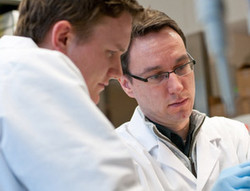
Enigmatic and incurable.
These defining characteristics of the brain’s most common and aggressive form of cancer are what motivate the research of Alexander Stegh, PhD, assistant professor in the Ken and Ruth Davee Department of Neurology and medicine.
Inside Stegh’s lab, researchers are working to uncover the genetic underpinnings of Glioblastoma multiforme (GBM), asking questions like: what are the genes critical for initiating the disease, and how is the disease driven?
“We are also interested in learning why it is that most chemo-therapeutic drugs, including targeted GBM agents, fail in the clinic,” said Stegh, a member of the Robert H. Lurie Comprehensive Cancer Center of Northwestern University and the Northwestern Brain Tumor Institute. “Some of these agents have certain efficacy in other forms of cancer with similar genetic backgrounds, but in GBM they are completely unsuccessful.”
For the past year, Stegh has pursued this therapeutic paradox. Funded by the American Cancer Society Illinois Division, the project identified a novel oncogene that is overexpressed in GBM, and clarified the gene’s role in thwarting therapeutic response.
“Moving forward, we have to continue to do a better job of understanding the genomic and genetic complexities of this disease,” Stegh said. “With The Cancer Genome Atlas – a program to identify the molecular basis of cancers – we took a huge step, but this appears only to be the tip of the iceberg. Right now, we only have an understanding of 10 percent of the genetic changes that are going on in GBM.”
As scientists develop a more comprehensive understanding of those genetic changes, researchers will discover how they contribute to the disease.
“Targeting these genes presents a very difficult challenge because many of them are unprecedented, meaning we have no idea how they work,” Stegh said. “Basically, we need a genetically-based technology such as RNA interference (RNAi) nanoparticles to actually target the genes we have already identified. That’s where I think bioengineering and nanotechnology come into play.”
Working in collaboration with Chad Mirkin, PhD, director of the International Institute for Nanotechnology at Northwestern, Stegh used a Northwestern University Center of Cancer Nanotechnology Excellence grant to pursue an ambitious proof of concept project.
The RNAi gold nanoparticles – measured in billionths of a meter – are able to turn off the production of an important cancer protein, acting as a potent inhibitor of tumor progression in vivo.
“It is a completely novel approach in thinking about cancer therapy. One of the problems is that we have large lists of genes that are somehow disregulated in GBM cancers, but we have absolutely no way of targeting all of them using standard pharmacological approaches,” Stegh said. “That’s where we think nanomaterials, in particular RNAi-based nanomaterials, can play a fundamental role in allowing us to implement the concept of personalized medicine in cancer therapy.”
Using the past 12 months to identify a target gene, Stegh’s lab will now work to pre-clinically evaluate an RNAi-based nanomaterial. The hope is to combine it with chemotherapy to increase the therapeutic sensitivity of GMB cancer cells and tumors.






